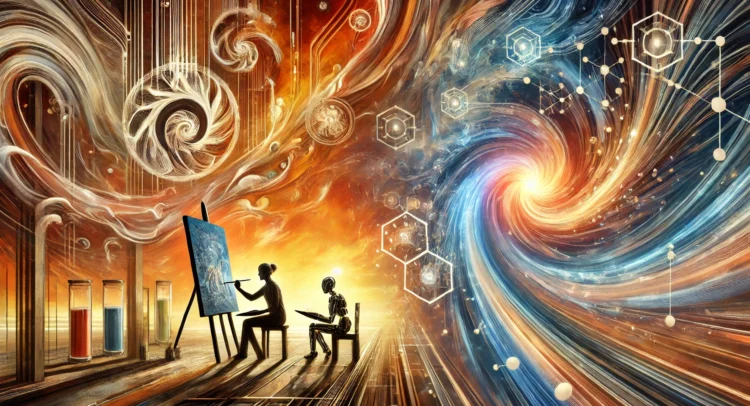In March 2023, at the Sony World Photography Award, a beautiful photo by Boris Eldagsen called “The Electrician” won first prize in the creative category. This black-and-white photo captures two generations of women positioned in the forefront, defying traditional photo-up framing. However, Eldagsen refused to accept the award after sharing that the photograph was created by AI image creator Dall-E 2. Of course, this admission caused some drama, eventually eliminating the photograph from the competition.
This anecdote is not an isolated example but an ongoing trend. Since the emergence of OpenAI’s Chat GPT in our lives, our work and creative habits have changed drastically. At first, we played with it, exploring its capabilities, but very rapidly, we started using it in almost every aspect of our work. We write, paint, program, and research, all with the help of AI, and sometimes even tasking it with 100% of our work. And we all know this is just the beginning.
It’s getting harder and harder to separate reality from simulation. For instance, Deep Fakes have already made a mess of everything, while OpenAI’s Sora, a text-to-video AI model, creates realistic imagery; nonetheless, like “The Electrician,” it’s not real.
Many Hollywood movies have depicted scenarios in which the characters cannot separate dreams from reality over the years; Paul Verhoeven’s 1990 film “Total Recall” comes to mind. However, in this case, we find it hard to separate reality from simulation.
The question then arises: How do we identify The Human Signature? How do we distinguish between AI and men? How far will we let AI take over our decision-making?
Investing Habits Are Changing
One of the hottest pursuits in the finance industry today is creating AI investing advisors. In short, the aim is to develop an AI investing consultant who will get to know their clients, their investing habits, aims and desires, risk tolerance, preferred industries, and more. This AI will have all the advantages in the world, calculating with ease the historical behavior of any stock, potential outcomes, and so on. In brief, it will have all the data it wishes to create the perfect investing portfolio. This could make today’s Wall Street analysts almost redundant. Initially, we’ll probably use it for small transactions or isolated decisions. However, we will likely grant it more and more power over our investing decisions over time until we provide it with full autonomy over our investing portfolio.
This sounds like a bulletproof plan but lacks the human signature, instinct, intuition, and know-how. Maybe your human consultant knows a certain company from within, not merely by data and numbers. Perhaps he’s familiar with the company’s work relations and knows it is due for a rise or even explosion in value, relying on data unavailable to AI. Human instincts and intuitions are advantages AI does not possess currently.
In his latest best-selling book, ‘Nexus,’ Yuval Noah Harari claims that one of the biggest problems we humans are heading towards is letting AI, eventually, make all of the decisions for us. His prediction is ominous and is probably more of a cautionary tale than anything else. However, differentiating between AI and human creation today has become relatively hard to accomplish, so in 10 years’ time, it’ll be almost impossible.
New Jobs, New Industries
Usually, when referring to AI’s emergence, we speak about how many will lose their jobs and who will become expendable. It’s important to stress that other jobs will emerge with the disappearance of others. One new position seems to be key in future industries (all industries) – “The Prompter.” Every company, from Nvidia (NVDA) to Apple (AAPL), will need an employee who knows how to ask the AI the right question and write the right prompt to get the most precise result from the AI assistant. Most of the big players will covet these future employees, and it’s not just in software; they’ll be needed in other industries like EVs, Energy, medicine, and every other industry you can think of. The prompter will be considered as a fingerprint of the human signature. But is it enough?
Glaring Challenges
In this age of fake news, when we can’t distinguish between truth and falsehood, man-made and AI, the challenges are staring us right in the face. How do we not lose our connection to our work, expertise, and, most importantly, our human touch? This can cause complacency and laziness, eventually allowing AI to take full control. Moreover, and even much more seriously, it will take over our story. We have created our modern society through stories and our interpretations of them. AI and the eventual emergence of commercialized quantum computing will threaten this continuation of storytelling, as we will hand over all the control to AI. Once that happens, we will stop writing the story ourselves and be nothing more than extras in a plot we have no control over.
Quantum Revolution in the Making
Although AI is still in its beginning, we can confirm that it does not possess consciousness. We’re not facing 2001: A Space Odyssey’s HAL 9000 just yet. However, Quantum Computing has started to roar its engines and become the new “space race,” with many tech companies getting in to try and achieve Quantum Supremacy. Google’s (GOOGL) latest reveal of ‘Willow’ has instigated a race between companies and governments, with IBM (IBM), IonQ (IONQ), Quantum computing (QUBT) and others making weekly progress in commercializing this science fiction material tech.
When a quantum breakthrough does happen, it will be an actual turning point. Theoretically, it can help us solve the universe’s mysteries and potentially possess self-consciousness. By then, we must decide how much power we grant it and where we humans are heading. Also, the borders between simulation and reality will dim even further, and the human signature will become dimmer. Probably, not definitely.
One Last Thought
Human instinct and human endeavors have gotten us literary masterpieces, extraordinary architecture, and great ingenuity in all facets of life. Now, with the aid of AI, instead of going forward, we are regressing and could lose our human signature in most things we do, mainly in our work. It will be a grand challenge to preserve everything that has gotten us to this point and not give AI full autonomy as it’s so comfortable and handy, but it’s not us. It lacks the human touch.
















